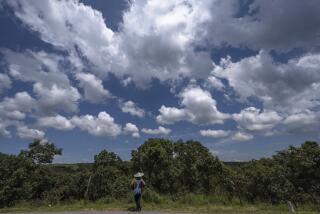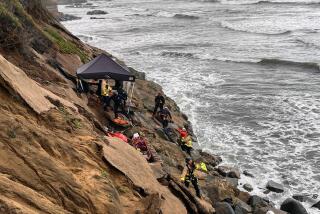Water pumps, drills and Buddhist prayers power desperate search for boys trapped in Thailand cave
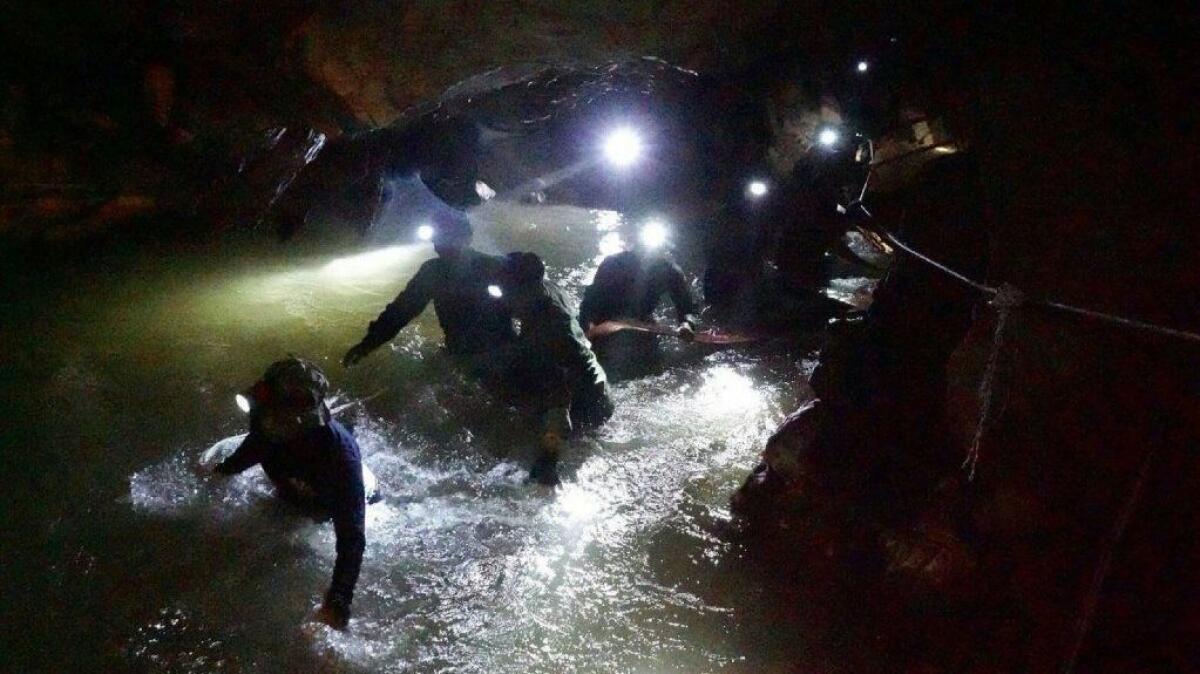
Sitting cross-legged on a table outside a labyrinthine cave, a monk meditated in the glow of a burning lamp and silently called on spirits to stop the rainfall.
A crowd formed a circle, and one by one, they came into the circle to light incense sticks.
Behind them, in the darkness, rescue workers toiled Sunday under the light of electric bulbs and amid the whir of drills and water pumps as the desperate search for 12 boys and their 25-year-old soccer coach continued for a ninth consecutive day.
The scenes inside and outside the Tham Luang Nang Non cave in northern Thailand — where the group is believed to have been trapped by rising waters — could not be more incongruous.
But technical rescue efforts and mystical ones have progressed alongside each other in Thailand, one of Southeast Asia’s most advanced economies, and home to a Buddhist culture that regards caves as holy sites for meditation, often watched over by spirits.
The prayers might have helped Sunday as the rain stopped, allowing water levels inside the roughly 5-mile-long cave to recede. Rescue officials said the water inside was becoming clearer as murky water was pumped out, allowing navy divers to venture deeper inside.
Divers have established a base at a chamber about one mile from the entrance. The group was believed to be at least one more mile beyond that point.
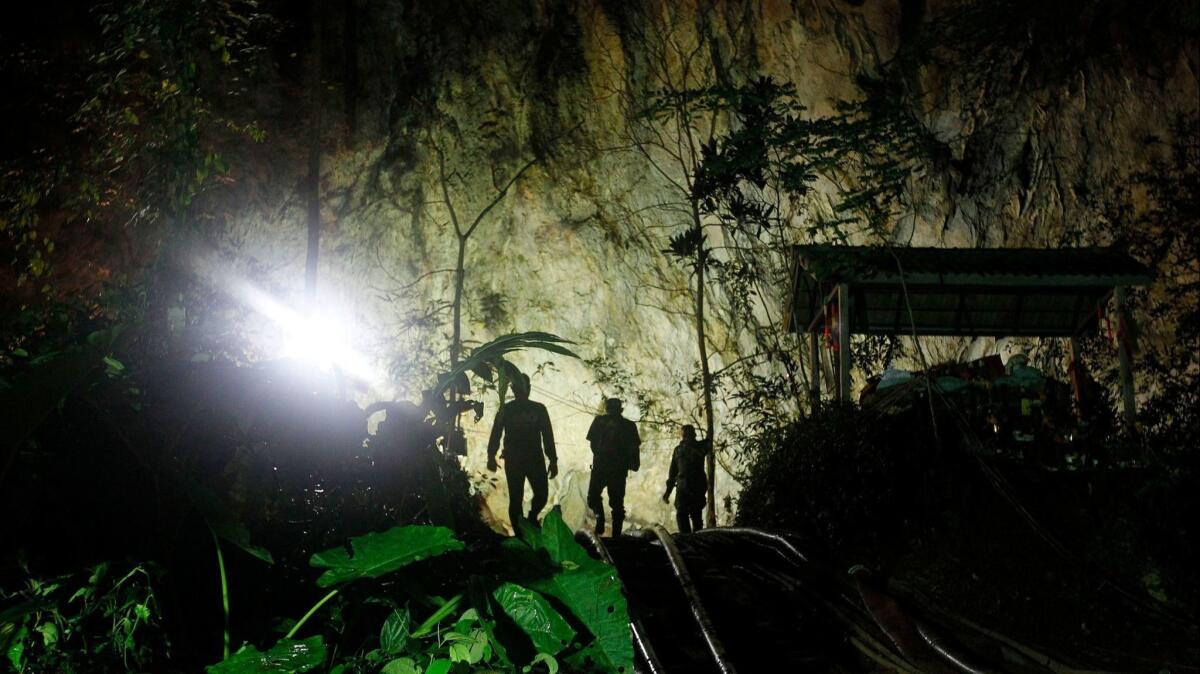
“We have drilled holes to pump out groundwater. We have discharged a lot, and the water level in the cave has decreased,” said the governor, Narongsak Osotthanakorn, noting that Thai navy SEAL divers were “happy with the progress.”
Since the boys — who range in age from 11 to 16 — and their coach went missing June 23 inside the tortuous dark passages of Thailand’s fourth longest cave, the divers’ progress has been slowed by steady rainfall and rising waters. Divers from China, defense personnel from Australia and communications specialists from Israel arrived Sunday to assist Thai crews.
As the operation moved into its second week with no sign of the missing, a crowd of monks and holy people outside the cave has increased as many look for spiritual guidance.
“It feels as if we are all in water and we need something to hang onto,” said a novice Buddhist nun who came from Bangkok, more than 450 miles away, to pray for the missing party and for the rain to stop.
The power of myth and spirituality, which permeate many aspects of Thai Buddhist culture, has strong significance here.
Legend has it that Jao Mae Nang Non, a beautiful princess of ancient times from a nearby district — now the city of Jinghong in southern China — fell in love with a stable boy and ran away with him after becoming pregnant. While her lover went to find food, soldiers sent by her father killed him.
She stabbed herself upon hearing the news.
Her body became Doi Nang Non, the mountain that houses the cave, and her blood became the Mae Sai river. Her spirit is said to guard the cave, where a shrine to her now stands.
Wanchai Thiensiri, a 59-year-old from the city of Chiang Mai, nearly 140 miles away, said everyone in northern Thailand grows up hearing the myth. While many modern Thais see it as the stuff of fairy tales, the story nevertheless lends the area a mystical presence.
A self-described religious skeptic, Wanchai said he was given an amulet by a monk who had been urging the clouds to disperse.
“If it stops raining here, I will forever keep this amulet,” he said.
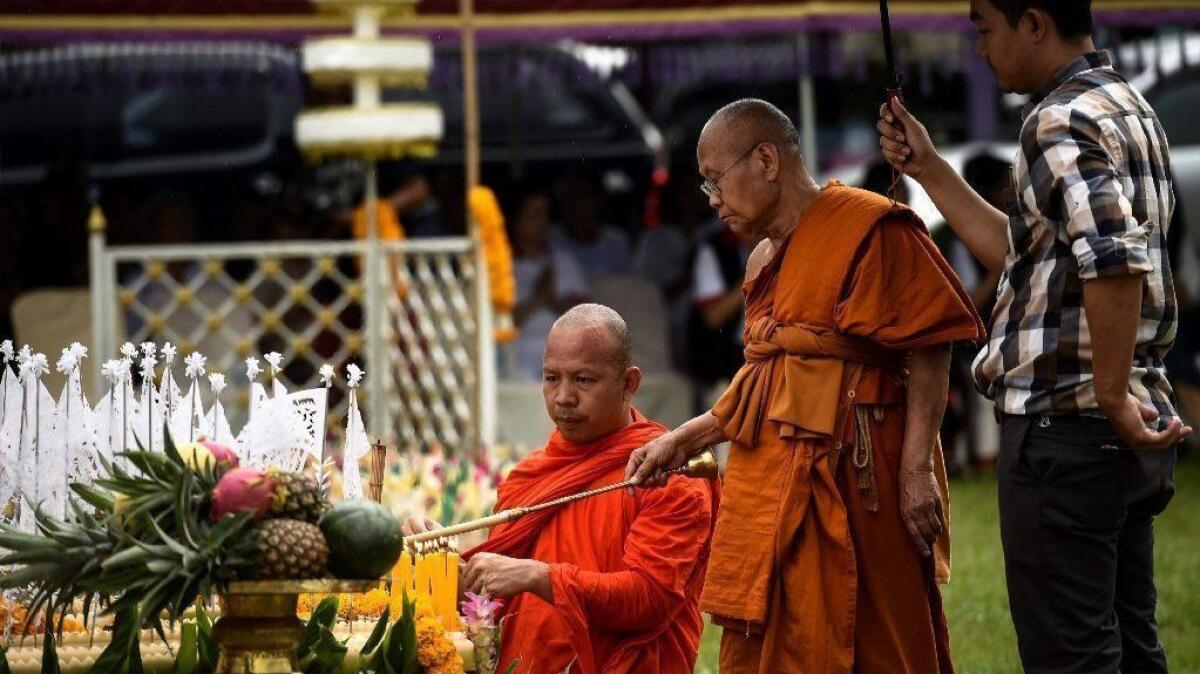
Several senior monks and holy people arrived to hold vigils at the site, where a festival-like atmosphere prevails on the muddy ground dotted with tents a few hundred yards from the cave entrance. Television news crews held cameras aloft as onlookers sought blessings from monks wearing red robes.
Some holy men took turns giving sermons and offering comfort to relatives of the missing, who sat in plastic chairs in an area cordoned off to the public.
Even Thai authorities have been appealing to the spirits by setting up shrines, burning incense and offering food and drink to the deities — including a boiled pig’s head and beer.
As one team of divers prepared to reenter the cave Sunday, a general stood on a plastic chair under the navy SEAL tent and bestowed blessings on his team. He slipped Buddhist bracelets on their wrists and gave them slaps on the back. The divers pumped their fists and shouted words of enthusiasm as an Israeli specialist joined in.
Edoardo Siani, a cultural anthropologist at Kyoto University in Japan who specializes in Thai Buddhism, said that by offering prayers and support, people become more than passive bystanders.
“It transforms them into a kind of rescuers rather than mere victims,” Siani said.
Chiang Rai resident Sirimongkhon Chummongkhon, 42, was about the same age as the missing boys when he explored the cave during the dry season with friends 30 years ago. He said he once nearly got trapped by rainwater about half a mile in but managed to find a small opening and escape.
He was unsure whether the boys could even access the same exit because the flooding these days seemed more severe.
It wasn’t until he was in his mid-30s that he considered there might be superior forces to contend with. On a visit to another cave nearby, he said, he climbed down a pitch-black shaft more than 150 feet deep to meditate.
When he reached the bottom, the flashlight he had brought and filled with brand-new batteries failed to light. He abandoned himself to despair — but found salvation in a mother and son who were down there too, collecting bat excrement for fertilizer. The son lighted a candle and helped him out of the cave.
“This made me not feel scared after that,” he said. “Because there are things that we cannot see with eyes or feel with our hands.”
Styllis is a special correspondent.
Times staff writer Shashank Bengali in Islamabad, Pakistan, contributed to this report.
More to Read
Start your day right
Sign up for Essential California for news, features and recommendations from the L.A. Times and beyond in your inbox six days a week.
You may occasionally receive promotional content from the Los Angeles Times.
